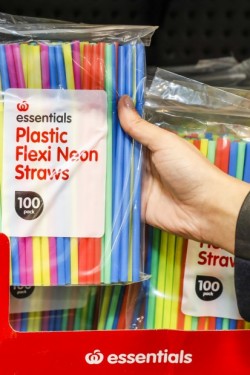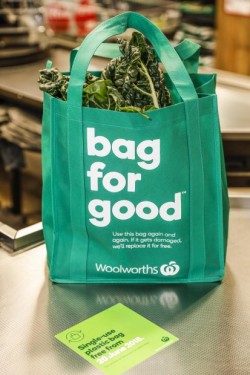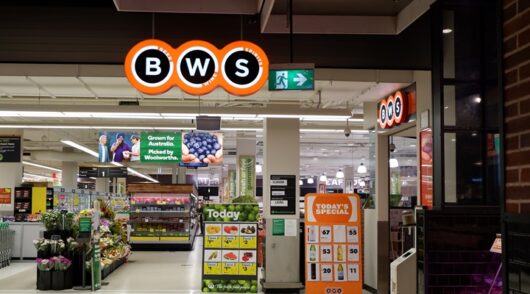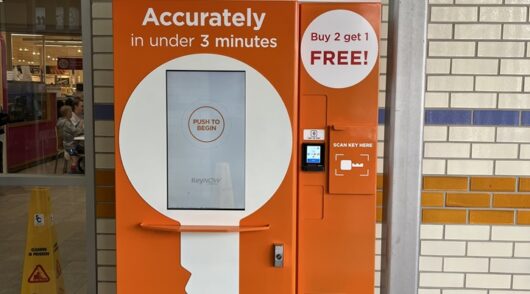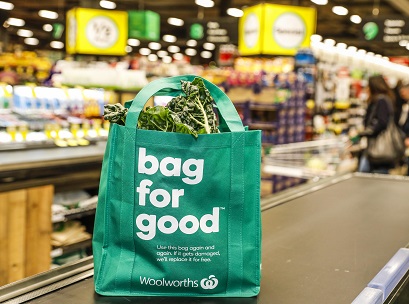 As price tensions between Australia’s grocery giants become slightly more rational a new battlefield has emerged in the supermarket wars – plastic.
As price tensions between Australia’s grocery giants become slightly more rational a new battlefield has emerged in the supermarket wars – plastic.
Coles and Woolies are going toe-to-toe in a bid to look beyond price and provide customers with environmentally friendly reasons to walk through the door, unveiling a raft of sustainability commitments on Monday.
Coinciding with World Environment Day, Woolworths’ hosted a sustainability forum at its HQ in Bella Vista to detail a series of new programs designed to satiate a consumer trend towards green living.
Coles followed suit with several of its own announcements ahead of what will be an interesting month for both supermarkets as they implement single-use plastic bag bans throughout their networks.
Woolworths will pull around 3.4 billion bags from stores by 20 June and by the end of the month will have placed dedicated plastic recycling bins across its 1000-plus store portfolio to encourage shoppers to bring back waste.
Woolworths will also cease stocking the 140 million plastic straws it sells each year by the end of 2018 as part of what Woolworths Group chief Brad Banducci said was an industry wide effort towards a circular economy on plastic.
“Its all about collective action,” he told a gathering of industry stakeholders on Monday. “Essentially we work together, or we can’t achieve what we desperately need to.”
The supermarket giant is also moving to reduce its general food waste, improve its ethical sourcing practices and increase its use of renewable energy – a point of interest for its bottom line.
Woolworths will have rolled out solar panels to 85 of its stores by the end of the year and has implemented a cloud-based energy monitoring platform to track power usage across its network.
Delicate balancing act
Both supermarkets committed not just to reducing plastic at the check-out but also within stores on Monday, particularly in the packaging of fruit, veg and meat products.
Woolies is trialing the reduction of plastic on 80 of its fruit & veg products over the next year in a bid to address mounting consumer criticism over the amount of packaging in its fresh aisle.
But Coles and Woolworths face a delicate balancing act with consumers, who while turning towards green practice are also demanding better quality produce.
“We know that customers don’t like it, we do however know that there’s a complex trade-off between keeping the product fresh and plastic,” Banducci said.
“If you end up throwing things away because you’ve taken plastic out then that is a false economy.”
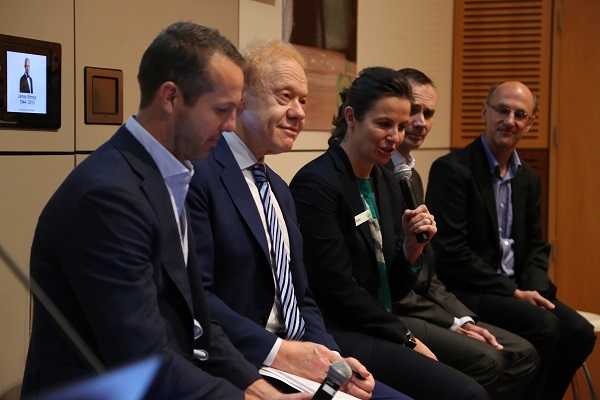
Harris Farm co-chief Angus Harris, also present at the Woolworths forum, said that identification of fresh products between organic or otherwise was also an issue for retailers.
Harris Farm has been working to reduce its plastic use for several years and has already phased out single-use bags, with customers turning onto cardboard boxes and paper bags.
The business has gone from averaging 2.5 plastic bags per shopper to half a plastic bag but has encountered some sceptics along the way.
“Consumers, they’re funny, they like convenience and we’re trying to tell them you’ve got to do something that’s less convenient,” he said.
Woolies’ managing director Claire Peters said education programs designed to help customers waste less, alongside explaining its quality predicament to shoppers would form part of future efforts to reduce in-store plastic waste.
“We’re working where we can [remove plastic] without damaging the product,” she said in a panel including Harris Farm Market’s co-chief Angus Harris, Visy executive chairman Anthony Pratt and Unilever ANZ CEO Clive Stiff.
Peters said Woolies will be providing two delivery options for customers after 20 June, either having goods delivered from tote bags to their kitchen benches or receiving goods in new reusable bags.
Those bags will be subject to a new recycling program where shoppers can return worn or torn 99 cent bags for a no-questions asked exchange.
Banducci said on Monday that Woolworths opted to pursue an exchange program after encountering a view in the market that the business would profit from reusable bags.
“When we said we were going to phase out single use plastic bags one of the things that actually upset me a little bit at the time was sort of the innuendo that we would profiteer,” he said.
“The incremental amount of time in store to actually service the customer when you aren’t using a single use plastic bag is material – it’s certainly not a profit driver.”
Coles unveils raft of commitments
Coles’ outgoing managing director John Durkan said in a statement on Monday that the supermarket would divert 90 per cent of its waste (including food, cardboard and plastic) from landfill by 2022.
“We know that 69 per cent of customers say that we need to actively reduce waste and landfill through recyclable packaging and find alternative uses for waste,” he said.
There are further plans to introduce more recycled materials in packaging and introduce in-store soft plastic recycling options in all supermarkets.
Coles has also pledged to halve food waste from its supermarkets by 2020 and donate unsold edible food from each one of its Australian supermarkets.
“By the end of this year we will also connect every Coles store to the vital food rescue program, SecondBite, meaning surplus edible food from every Coles supermarket will be redistributed to people in need,” Durkan said.
While food rescue has emerged as a major priority for both Coles and Woolworths, Harris and Peters both agreed that there is still a sizable amount of non-edible produce being wasted behind the scenes.
“Our biggest challenge is those ones that are no longer saleable that have to go to waste,” Harris said.
“It’s one that we are all working on because effectively if we can’t give it to someone and we can’t sell it that means we are throwing it in the bin.”
Both Harris and Peters believe more work needs to be done further up the supply chain to address such issues.
Lack of recycled plastic in the Australian market
Unilever ANZ chief Clive Stiff said that the FMCG giant would likely need to import recycled plastic into Australia in the coming years to meet a2025 sustainability commitment to increase recycled content in packaging to 25 per cent, as there currently isn’t enough available locally.
“[It] would be a real travesty of justice,” he said. “We need to have a real circular economy right here.”
Nevertheless, with consumers turning out in droves to support sustainable supply chain initiatives in recent years, Stiff said business needs to act.
“We have to do the right thing,” Stiff said. “It just makes good business sense as a moral case and a business case.”
“48 per cent of Australians would pay more for a product that is more sustainable,” he said.
Stiff said capital investment in technologies that could produce recycled packaging and the sensitivity of recycled goods to oil prices remained barriers to introducing more recycled plastic.
Access exclusive analysis, locked news and reports with Inside Retail Weekly. Subscribe today and get our premium print publication delivered to your door every week.

